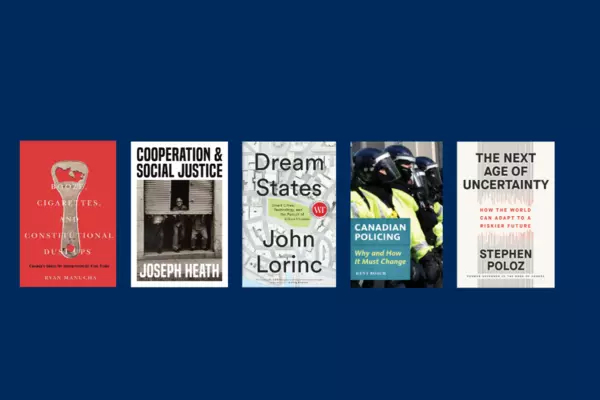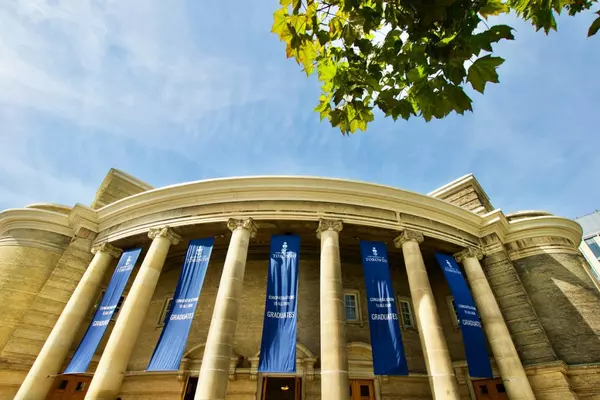
Michael Donnelly is an associate professor in the Department of Political Science and the Munk School. His research focuses on issues concerning welfare states and immigration at the intersection of public opinion and public policy in North America and Europe.
Donnelly came to the University of Toronto in 2014 from the European University Institute, following his Ph.D. at Princeton University. He has recently been appointed as director of Professional Master’s Programs, overseeing the Master of Global Affairs and Master of Public Policy program portfolio.
Congratulations on your new appointment as director of Professional Master’s Programs. What are you most looking forward to in this position?
There’s a lot to get my head around trying to figure out the different moving pieces of two very big, well-run programs that are similar in some ways and very different in others. I’m looking forward to learning more about both programs, but especially the MGA, which I haven’t been as involved in previously. Meeting lots of people has been quite a lot of fun.
Your research focuses on how public opinion and public policy intersect. What are some of the broad factors that shape policy outputs?
Policy outputs are driven by a combination of ideas, interests and institutions. I focus on how interests shape ideas and institutions, and then how they interact to shape policy. I’ve done a lot of work on how people form their opinions on the welfare state, if they think we should have more or less redistribution and whether the government should do more to reduce poverty or to restrict inequality. Regional and ethnic inequality often shape the ideas of people who experience it in a real-world context. That, in turn, forms how they think the government should respond.
Speaking from a cultural perspective, what are some examples of these factors and contexts?
If you’re a member of a relatively high-income group, does that make you optimistic about your future material prospects, even holding constant to your current material wellbeing, meaning your current income or wealth? For instance, I have argued that if you are a member of a relatively poor ethnic group, you might be more pessimistic about your future income and therefore more pro-redistribution. We see the same kind of pattern at the regional level with the caveat that some regions, for various historical-material reasons, are generally conservative on cultural issues and tend to be relatively poor. There is a contingency around how politicians have tried to frame redistribution. For people who live in fully centralized states, where everyone pays into the same pot and gets money from the same pot, regional inequality means less because people don’t argue about redistribution as a regional thing.
On the other end of the spectrum there are places like Canada, where a lot of the welfare state flows through provincial capital so a lot of interpersonal redistribution is done by the province. Here, there’s a bit less room to say, ‘we’re a poor’ province, let’s think about moving to the left’ or ‘we’re a rich province, let’s think about cutting taxes precisely because the dimensions of political competition are matched down to the lower level.’
It’s at these intermediate contexts, such as the United Kingdom. Here, there is substantial evolution at the regional level with regional identities that are politicized in part by institutions. But there isn’t that much scope for intraregional interpersonal redistribution or the politics of the left versus right within the greater Manchester region or the politics of left versus right within the Southwest. Instead, their money goes to London and then comes back through redistribution.
I’m sure you’ve observed a multitude of stances on the welfare state. Can you talk about the spectrum of attitudes and how we can talk about it?
If you just ask people if we should do more to reduce inequality, overwhelmingly they say yes. It becomes curious when you begin applying budgets and start the conversation on how much you would be willing to pay in extra taxes to reduce inequality. How much do you want to see the government spend money on people who are not yourself? Almost everyone thinks government should spend more money on them and less on other people. In aggregate, attitudes toward the welfare state are positive and that’s true in most countries. The United States can be seen as an outlier, but even then, it’s pretty positive.
The challenge lies where you get into stereotypes of the underserved. There is literature on what we typically call ‘welfare state deservingness’ — people have different beliefs about how hard working the poor are, whether they are trying to do better for themselves or are just surviving on whatever the government gives them. There are studies regarding stereotypes about people who receive benefits, among people who receive benefits. You see negative descriptions of other people who get benefits, but this comes from a misunderstanding of what the welfare state is, where the money gets spent and who the beneficiaries of the welfare state are. Often it is the disabled, the very sick or the people who are too old to work. One way we might think about changing attitudes is getting people better informed. It’s hard to convince people they’re wrong, and there are politicians who want people to believe that most government spending is a waste. So, you’ll see that kind of rhetoric, and when you do, it’s often driven by a desire to convince people to develop these negative attitudes toward welfare state recipients.
They vary in the degree, but by far, the best anti-poverty program in most countries is a pension for people who are retired or disabled. If you look at most countries when we start talking about the welfare state we’re talking about healthcare and pensions. Those are the two major aspects in every welfare state budget — whether it’s the Canada Pension Plan, Social Security in the United States or the State Pension in the United Kingdom, many countries have pensions that are highly redistributive.
So, a mix of in-group fighting and misunderstanding amongst people who receive pensions and welfare assistance — it seems as if education and trust-building to dispel misconceptions on a large-scale is needed.
I think the best evidence suggests that the kind of education you need is indeed more about building trust in the state. For some societies it has been fairly successful — if you look at trusting the government in Sweden or Norway, people basically assume the government has their best interests at heart. I’m always jealous of my colleagues who work in those countries because they can go to the government and request to look at all the tax records for every citizen and immigrant in the country.
Some bureaucrat looks at this and says, ‘You are a government employee. You have a reason to do this. I trust you not to give away the data. Sure, you can have tax records.’ There’s bureaucracy involved, but they get to do research using data that no Canadian would tolerate being shared with me as an academic. There is a lack of trust and people are skeptical that those organizations are going to make the right decisions around their data or how to hand out money, and so they are less likely to trust the government to properly design a welfare state.
So, in terms of building civic trust, we should take some cues from Nordic countries. Some of your research explores the idea of ‘linked fate.’ What does that mean and what are some of the material or tangible applications?
Linked fate is an idea that comes out of literature on African American politics in the United States and is the belief that what happens to other members of your group matters for what happens to you.
This is a sort of miscellany of material arguments that ‘the people around me have jobs so they’re going to help me find a job.’ It involves a more metaphysical set of ideas tied up in Black cultural institutions, particularly the Black church in the United States, which is an institution that has often promoted this soteriological argument that part of the way you get to God is through community.
You can extend this to other groups and I’ve argued this in other contexts, across various cleavages, not just race or ethnicity but also region and class. The argument that I make is that we can’t understand politics and public opinion as purely about rational choice, material interests or about culture and identity. Culture and identity shape how people think about interests and people’s interests shape how they think about their identity, and these things are just linked in a way that pretending we can separate them is unproductive. In fact, these things are deeply, deeply tied.
I’m working with a colleague here at U of T and a colleague at Queen’s University on linked fate among LGBTQ+ Canadians and Americans, looking at why people think that their interests are bound up with other members of that community and about the extent to which they map linked fate with a narrower group. This could be like how a gay man thinks what happens to other gay men might affect him.
Would you say that the idea of linked fake connects in some ways to attitudes on the welfare state?
I think it does — it’s pretty clear that if you think what happens to other people around you matter, you’re going to try to help them. Now, how would this look in terms of linked fate among a relatively wealthy group? Is there opposition to taxation among groups that are very wealthy? If you look at white Americans, their belief in linked fate or other measures of white identity tend to be associated with conservatism, though not as strongly associated with economic conservatism as with other forms. As with, for instance, opposition to immigration, which is another big line of work.
The difficult part is figuring out what really rich people think. Warren Buffett probably is not going to answer my survey if I send it to him. This varies by country, but education pushes you one way, in general to the left which is a combination of what occupation you end up in and what you learn while you’re being educated. Then income pushes you in the other direction and to oppose redistribution. We think if you could get a good measure of the top 1%, they’d be pretty right wing in part because the top 1% have a lot of people who have their bachelor’s, law or medical degrees, but not that many with doctorates or the like.
With your new appointment as the director of programs, you’re overseeing the MGA and MPP portfolio. What is your vision for these programs?
The goal is to train future leaders who will be able to apply what they've learned in the MPP or the MGA to truly change how the world works, to make the world a better place in whatever fashion they think that is.
I'm also really excited to have more international students. Canada is pretty good at public policy design, but there is something to be said about the invaluable knowledge and experience coming from those outside the country. Ultimately, MPP and MGA students will bring to the Munk School new ways of approaching problems that we haven't thought of. This will only make the programs stronger.
I’m excited to integrate new faculty who are going to offer a wealth of ideas about different places in the world and diverse ways of engaging with public policy and global affairs. I’m looking forward to growing the programs. There are so many resources we have brought in recently to build out the programs and I’m optimistic we can give students a complete experience in their two years of study.



